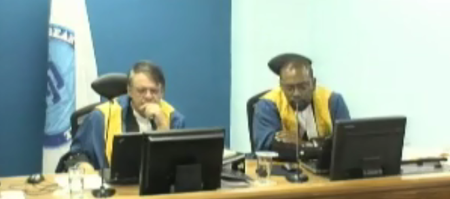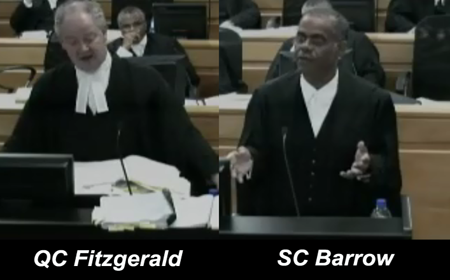BELIZE CITY–The Caribbean Court of Justice (CCJ) expects to hand down a landmark decision in January 2015 in the 6-suit challenge which stems from the Government of Belize’s nationalization of two public utility companies: the Belize Electricity Limited (BEL) and the Belize Telemedia Limited (BTL).
On December 10-12, 2014, the CCJ held hearings at its headquarters in Trinidad and Tobago, on consolidated claims filed by the Ashcroft group of companies and Fortis Inc. against the Attorney General of Belize and the Minister of Public Utilities.
Lord Peter Goldsmith of the UK appeared for Dean Boyce and the BTL Employees Trust. His co-counsel, Godfrey Smith, SC, of Belize was not present for the hearings.
Goldsmith, attorney for the former shareholders of BTL, told the court that it has been 5 years, 3 months and a number of days since the property was expropriated, and they have been waiting to come to the CCJ, “hoping and expecting this court will finally be able to give them justice and indeed help to restore the rule of law in Belize…”
The challengers, which do not really include BTL workers but the trust company created and controlled by the Ashcroft group, contend that the Government made an unconstitutional expropriation and used the 8th Amendment to the Belize Constitution to try to oust the jurisdiction of the court and preempt a decision on the alleged breach of their client’s property rights.
Meanwhile, Queen’s Counsel Edward Fitzgerald of the UK appeared with Pricilla Banner and Eamon Courtenay, SC, of Belize for Fortis Energy International (Belize) Inc., while Courtenay appeared with Jose Alpuche for British Caribbean Bank.
Fitzgerald told the CCJ that Fortis, which had invested BZ$200 million in the electricity sector from 1997-2008, found itself targeted in a campaign by the Government to force the company to reduce rates even while the Government increased its business taxes.
He said that amid questions of blackouts taking place, the Government and the company were engaged in talks about a potential buyout. He said that Fortis had agreed to negotiate the sale of their shares, but without notice or consultation, the Government nationalized the company on the claim that they needed to maintain a reliable source of energy.
Fortis also challenges the constitutionality of the nationalization of BEL. Fitzgerald told the court that Parliament has no authority to pass a law inconsistent with section 17, and it was therefore void.
Goldsmith said that in 2011, after exhaustive and careful hearings, the Court of Appeal of Belize held that the acquisition of BTL was unconstitutional, because was it was made for an illegitimate purpose.
He added that nothing changed, except for “a discreditable attempt to distort [the] Constitution of Belize, to try to prevent judicial scrutiny of their [the Government’s] actions,” which Goldsmith said was a direct assault on the rule of law.
He claimed that because of the constitutional amendment, the appellants no longer have a right to the protections under Section 17 of the Belize Constitution – that is, the fundamental right to protection of property.
Courtenay told the CCJ that he associated himself with the submissions made by Goldsmith and Fitzgerald.
In presenting the case of British Caribbean Bank, Courtenay said that there were three loans and related property rights acquired by the Government.
“The importance of all of this is now the amount due and owing to [the] bank is in excess of US$50 million,” he told the CCJ.

Courtenay said that whereas the Government has taken the position that the loan transactions which BTL made with British Caribbean Bank are not valid, the bank fully disputes that position.
“We have every confidence that the security is valid and legal… but we believe that it demonstrates to this court the extent to which the Government would go in order to frustrate the right of the bank to be paid its money. It cannot have its cake and eat it,” Courtenay said, at the hearing.
Goldsmith argued that “the 2011 legislation, by which we mean the Act, the Order and the Eight Amendment, is unconstitutional because it circumvents or it is intended to circumvent the 2011 judgment.”
He said that the legislation, which targets one man – meaning Mr. Ashcroft – is a harmful ad hominem legislation which, apart from being unconstitutional, breaches principles of natural justice, due process, and equal protection of the law.
Senior Counsel Denys Barrow and Naima Barrow appeared for the Government of Belize in all matters.
In defending the Government of Belize’s position, Barrow told the CCJ that “a validly-passed piece of legislation, satisfying the formal requirements is capable of derogating from, adding to, qualifying, excepting…”
He said that the 8th Amendment of 2011 became law after the 90-day waiting period was satisfied.
“Great questions have been raised as to the validity of legislation,” said Barrow, pointing to questions over whether such powers could also be exercised to reintroduce slavery or to keep a government in office for 10 years without intervening elections.
Barrow said that the constitutional amendment was trimmed down through the intervention of the Council of Churches, which participated in the public consultation process, following concerns over whether a government with a super majority could do anything it pleases.
He told the CCJ that the legislation was subject to effective participation of the public, which made the intended legislation less sweeping and less powerful.
“Now Government has said that the Legislature has decided and decreed that it was for a public purpose and therefore the courts cannot look at it,” Goldsmith argued.
The attorney argued that the 8th amendment was done to override a 2011 decision of the Court of Appeal.
Barrow said, though, that it is not possible for the 8th amendment to oust the jurisdiction of the court in the matter.
“What the law is, is for the court to state. There is nothing in [the] 8th amendment which purports to tell the court how to decide,” said Barrow.
Courtenay told the CCJ Friday that the central question is this: Were the acquisitions lawful?
In its summary of what it describes as “a ground-breaking case for the Caribbean,” the CCJ noted that in 2011, the Government sought to correct its misstep in the 2009 nationalization statutes and passed additional Acts, thereby finding favor with the Court of Appeal.
“Following the decision that the 2011 Acts were valid, Boyce, BCB along with Fortis International lodged the appeals in the CCJ. It is in relation to these matters that the Attorney General then filed a cross-appeal,” it explained.


